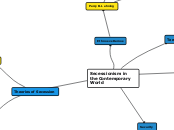Secessionism in the Contemporary World
Theories of Secession
Security
Ahsan I. Butt
Security of Economy
What will be the economic conditions
of the old and new States?
"The ethnic group can freely use its state to extract resources from its population in the form of taxes as well as fashion certain economic policies such as industrialization, the construction of dams and irrigation canals, and targeted investment in certain sectors of the economy."
Approaches to
conflict resolution
Non-Intervention
"Outside intervention aimed at reducing violence has to walk a tightrope: it must be targeted at the state’s leaders, without giving the impression that it “sides” with the secessionists."
"If intervention does arise in separatist disputes, it is unlikely to be aimed at the security of the minority at risk; rather likely to be precisely the type of intervention that intensifies violence".
Coercion
"(...) when separatists become tied to external rivals of states, they become susceptible to pathological levels of violence, fueled by a sense of collective betrayal among both leaders and security forces."
International Law
Marcelo G. Kohen
External intervention
UN Intervention
Intervention of other states
"Third States are bound by the principles of the non-use of force, non-intervention and self-determination when they contemplate intervening by force in a secession conflict. The most important legal distinction in this context is whether a State intervenes on the side of the recognized government of the State concerned or on the side of its opponents."
International Law 'Neutrality'
"The traditional view was that secessionist movements, when not under foreign control, were a purely internal affair."
Ahsan I. Butt
Global Policy
Terrorism
Sebastian Wojciechowski
"Do individual factors influence terrorism in a different manner than fundamentalism or separatism?"
Claribel de Castro Sánchez
"The triad security/immigration/terrorism has now reached enormous significance after multiple terrorist attacks (...). After these attacks, the different positions on how to manage the refugee crisis in Europe have become more bitterly opposite."
Ethnos vs Demos
Percy B. Lehning
Demos
Allen Buchanan
Percy B. Lehning
Remedial Rights Theory
Primary Rights Theory
"(...) assert that a group has a general right to secede if and only if it has suffered certain injustices, for which secession is the appropriate remedy of last resort."
"(...) assert that certain groups can have a (general) right to secede in the absence of any injustice."
"Different Remedial Right Only Theories identify different injustices as warranting the remedy of secession."
"Different Primary Right Theories pick out different conditions that groups must satisfy to have a right to secede in the absence of injustices."
Buchanan, 1997, p.35
Buchanan, 1997, p.34
Buchanan, 1997, p.35
Buchanan, 1997, p.35
Approaches
Perspectives
Anti-secessionists
"(...) oppose the right to secession, except under certain conditions"
Pro-secessionists
"(...) who support it, subject to certain conditions"
Liberal political theory
Permissive
"(...) there is a right of secession, indeed evena right of unilateral secession."
"If a group of people perceive themselves as having a distinct culture and traditions, and they are extensively predominant in a distinct territory, can they then justifiably secede from a nation-state in which they are embedded if they elect, by a democratic decision,"
Against
"(...) there is a restricted right to secede, as well as to cultural preservation"
